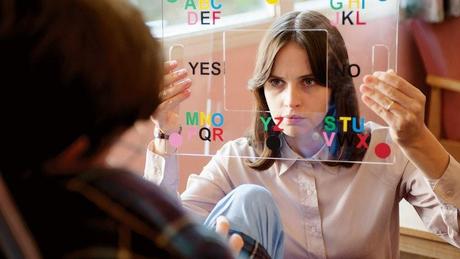 To most people, Stephen Hawking is either an inscrutable genius or Lisa Simpson's robot buddy. The Theory of Everything (2014) reminds us that even scientists are human beings. Director James Marsh succeeds telling a human story, even if he simplifies Hawking's life and work.
To most people, Stephen Hawking is either an inscrutable genius or Lisa Simpson's robot buddy. The Theory of Everything (2014) reminds us that even scientists are human beings. Director James Marsh succeeds telling a human story, even if he simplifies Hawking's life and work.In 1963, Stephen Hawking (Eddie Redmayne) is a Cambridge grad student working on a physics thesis. He falls for Jane Wilde (Felicity Jones), an outgoing lit major. Shortly afterwards, Hawking's diagnosed with ALS, a degenerative disease. Confined to a wheelchair, Hawking becomes an acclaimed physicist, leaning on Jane for support. But Hawking's fame and worsening condition takes an emotional toll on him and Jane - especially when Jonathan (Charlie Cox) enters the picture.
The Theory of Everything works as a unique relationship drama. Stephen and Jane make an adorable young couple, attending UV light dances and playing croquet. Jane declares her undying allegiance to Stephen, spurring him from depression to accomplishment. As Stephen's body deteriorates his mind achieves greatness: Theory becomes breathtakingly inspirational. At the same time, their relationship comes under unbearable strain. Sadly, love can't withstand everything.
Here, Marsh and writer Anthony McCarten avoid regrettable cliche. How many films show an inspirational hero ditched by his uncomprehending wife? Theory feels more organic: Jane has the strength to ballast her husband, but only at her own expense. Their playful banter over religion becomes serious argument; Jane seeks her own life, attending church where she meets Jonathan. Jonathan is a lonely widower seeking to fill his own void; they're made for each other. Theory handles this with commendable tact, leading to a bittersweet ending.
When biopics "humanize" their heroes, they invariably simplify their achievements - especially Lucasian mathematics and black holes. Thus Theory reduces Hawking's theories to half-comprehended buzzwords. This is fine for dummies like me who don't know a quark from a kumquat, but I can imagine experts and science nerds resenting the simplification. Either way, scenes like Hawking's buddy explaining space-time singularity with beer foam seem unduly patronizing.

For all that, it's hard to resist Theory. Marsh's direction is straightforward, elegant, unfussy. For every weak scene, there's an affecting moment: the halcyon college days, Stephen's pneumonia episode juxtaposed with Wagner. Everything feels restrained and well-judged, rarely going for the obvious or overwrought. Well, Stephen standing up from his chair in a dream sequence is rather ridiculous.
Eddie Redmayne won Best Actor for his performance. He's sweetly awkward as a young man, then tragically depressed, forcefully infused with Jane's energy. Redmayne shows Hawking's struggle to remain both brilliant and normal, success making him arrogant and testy. Redmayn gets the surface right but also the mannerisms, the right glance and inflections to suggest Hawking's growing desperation. His brilliance and resolution shines through, transcending mere contorted impersonation.
Felicity Jones provides an excellent contrast. Sweet, vivacious and devoutly religious, she bolsters her husband while resenting her lack of freedom. Jones matches Redmayne, molding her personality from perky undergrad to exasperated woman. Charlie Cox makes Jonathan likeable rather than sleazy, a lost soul himself. David Thewlis plays Hawking's amiable adviser; Emma Watson, Simon McBurney and Maxine Peake feature in supporting roles.
I enjoyed The Theory of Everything despite its award-bait pedigree. Where The Imitation Game and Selma want to make deep statements on well-covered topics, Theory settles for intimate drama. This straightforwardness serves Theory well: let the script and actors work, not its self-proclaimed importance.

